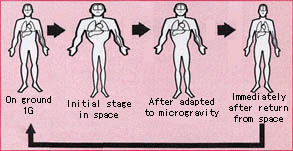Since The Leonardo has been hosting the travelling exhibit Aliens & Androids the team here has been particularly sensitive to the progress in space travel technology and discoveries in outer space. Just this week, NASA announced the discovery of 7 new exoplanets a mere 40 light-years away (it takes 40 years for light, the fastest thing in the universe, to get to them.) Though probably too far away to reach, these are some of the closest Earth-like planets we’ve discovered. And the closer these discovered planets get, the more we’ll have to consider how exactly we make the journey to them.
To even consider such adventures, we have to study the effects the environment of space has on a human body, even when housed in a shuttle or a space suit. So far, the longest stay in space was accomplished by cosmonaut Valeri Polyakov, who spent 438 days on Mir, the former Russian space station. These are some of the common (and weird) effects we can expect within that time limit.
More than any other effect, astronauts experience what is called Space Adaptation Syndrome (SAS), especially during the first few hours of adjusting to a weightless environment. A cousin of motion sickness, SAS can include nausea, vomiting, vertigo, headaches and tiredness. It’s a bummer, and close to half of all human beings who have flown into outer space experience this syndrome.
Another inevitable effect of spending long periods in space is the loss of muscle mass. It’s easy to forget how much work our muscles do just to hold us upright on a planet where gravity is a constant strain — not to mention how much energy it takes to move us around! With no or very little gravity, muscles that normally help us maintain posture, walk and lift things — muscles in our back, legs and core — get almost no workout in space. It isn’t too long before these muscles start to weaken and eventually shrink. Astronauts have to fight this off with specific exercises that they perform regularly.
One of the creepiest effects I discovered is called ‘fluid redistribution.’ A weightless environment readjusts the body’s pressure systems in a major way, which affects where fluids like to concentrate. For example, the water in our body is redistributed to the upper body almost immediately after entering space, which causes bulging neck veins, puffy face and sinus and nasal congestion. Astronauts tend to describe this as feeling like a common cold. Weightlessness has a similar effect on our blood, which is typically pulled to the lower body while on Earth. However, in space, blood settles in the upper body instead and can cause some nasty side effects. Thankfully, an astronaut’s body almost always recovers from these effects when they return home.
Astronauts and cosmonauts have also reported the calluses on the bottoms of their feet molting away, while the tops of their feet become painfully sensitive. Those who have cried noticed that tears don’t fall normally from the eyes, but clump together into a salty ball. You can only imagine the other effects we’ll discover as we prepare to travel to planets in our own solar system — the journey to Mars will take roughly 20 months — and eventually to those outside of it.






